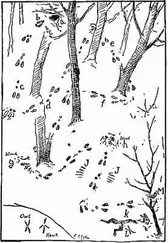Ernest Seton - Rolf in the Woods
Здесь есть возможность читать онлайн «Ernest Seton - Rolf in the Woods» весь текст электронной книги совершенно бесплатно (целиком полную версию без сокращений). В некоторых случаях можно слушать аудио, скачать через торрент в формате fb2 и присутствует краткое содержание. Год выпуска: 1997, Жанр: Приключения про индейцев, Исторические приключения, на английском языке. Описание произведения, (предисловие) а так же отзывы посетителей доступны на портале библиотеки ЛибКат.
- Название:Rolf in the Woods
- Автор:
- Жанр:
- Год:1997
- ISBN:нет данных
- Рейтинг книги:3 / 5. Голосов: 1
-
Избранное:Добавить в избранное
- Отзывы:
-
Ваша оценка:
- 60
- 1
- 2
- 3
- 4
- 5
Rolf in the Woods: краткое содержание, описание и аннотация
Предлагаем к чтению аннотацию, описание, краткое содержание или предисловие (зависит от того, что написал сам автор книги «Rolf in the Woods»). Если вы не нашли необходимую информацию о книге — напишите в комментариях, мы постараемся отыскать её.
Rolf in the Woods — читать онлайн бесплатно полную книгу (весь текст) целиком
Ниже представлен текст книги, разбитый по страницам. Система сохранения места последней прочитанной страницы, позволяет с удобством читать онлайн бесплатно книгу «Rolf in the Woods», без необходимости каждый раз заново искать на чём Вы остановились. Поставьте закладку, и сможете в любой момент перейти на страницу, на которой закончили чтение.
Интервал:
Закладка:
Skookum, without either means of meeting the trouble was left much alone in the shanty. Apparently, it was on one of these occasions that the silver fox had driven him nearly frantic by eating rabbits on the roof above him.
The exasperating robbery of their trap line had gone on irregularly all winter, but the thief was clever enough or lucky enough to elude them.
They were returning to the cabin after a three days' round, when they saw, far out on the white expanse of the lake, two animals, alternately running and fighting. "Skookum and the fox," was the first thought that came, but on entering the cabin Skookum greeted them in person.
Quonab gazed intently at the two running specks and said: "One has no tail. I think it is a peeshoo (lynx) and a fox."
Rolf was making dinner. From time to time he glanced over the lake and saw the two specks, usually running. After dinner was over, he said, "Let's sneak 'round and see if we can get a shot."
So, putting on their snowshoes and keeping out of sight, they skimmed over the deer crossing and through the woods, till at a point near the fighters, and there they saw something that recalled at once the day of Skookum's humiliation.
A hundred yards away on the open snow was a huge lynx and their old friend, the black and shining silver fox, face to face; the fox desperate, showing his rows of beautiful teeth, but sinking belly deep in the snow as he strove to escape. Already he was badly wounded. In any case he was at the mercy of the lynx who, in spite of his greater weight, had such broad and perfect snowshoes that he skimmed on the surface, while the fox's small feet sank deep. The lynx was far from fresh, and still stood in some awe of those rows of teeth that snapped like traps when he came too near. He was minded, of course, to kill his black rival, but not to be hurt in doing so. Again and again there was in some sort a closing fight, the wearied fox plunging breathlessly through the treacherous, relentless snow. If he could only get back to cover, he might find a corner to protect his rear and have some fighting chance for life. But wherever he turned that huge cat faced him, doubly armed, and equipped as a fox can never be for the snow.
No one could watch that plucky fight without feeling his sympathies go out to the beautiful silver fox. Rolf, at least, was for helping him to escape, when the final onset came. In another dash for the woods the fox plunged out of sight in a drift made soft by sedge sticking through, and before he could recover, the lynx's jaws closed on the back of his neck and the relentless claws had pierced his vitals.
The justification of killing is self-preservation, and in this case the proof would have been the lynx making a meal of the fox. Did he do so? Not at all. He shook his fur, licked his chest and paws in a self-congratulatory way, then giving a final tug at the body, walked calmly over the snow along the shore.
Quonab put the back of his hand to his mouth and made a loud squeaking, much like a rabbit caught in a snare. The lynx stopped, wheeled, and came trotting straight toward the promising music. Unsuspectingly he came within twenty yards of the trappers. The flint-lock banged and the lynx was kicking in the snow.
The beautiful silver fox skin was very little injured and proved of value almost to double their catch so far; while the lynx skin was as good as another marten.
They now had opportunity of studying the tracks and learned that the fox had been hunting rabbits in a thicket when he was set on by the lynx. At first he had run around in the bushes and saved himself from serious injury, for the snow was partly packed by the rabbits. After perhaps an hour of this, he had wearied and sought to save himself by abandoning the lynx's territory, so had struck across the open lake. But here the snow was too soft to bear him at all, and the lynx could still skim over. So it proved a fatal error. He was strong and brave. He fought at least another hour here before the much stronger, heavier lynx had done him to death. There was no justification. It was a clear case of tyrannical murder, but in this case vengeance was swift and justice came sooner than its wont.
Chapter 41.
The Enemy's Fort
It pays 'bout once in a hundred times to git mad, but there ain't any way o' tellin' beforehand which is the time.
Sayings of Si Sylvanne.It generally took two days to run the west line of traps. At a convenient point they had built a rough shack for a half-way house. On entering this one day, they learned that since their last visit it had been occupied by some one who chewed tobacco. Neither of them had this habit. Quonab's face grew darker each time fresh evidence of the enemy was discovered, and the final wrong was added soon.
Some trappers mark their traps; some do not bother. Rolf had marked all of theirs with a file, cutting notches on the iron. Two, one, three, was their mark, and it was a wise plan, as it turned out.
On going around the west beaver pond they found that all six traps had disappeared. In some, there was no evidence of the thief; in some, the tracks showed clearly that they were taken by the same interloper that had bothered them all along, and on a jagged branch was a short blue yarn.
"Now will I take up his trail and kill him," said the Indian.
Rolf had opposed extreme measures, and again he remonstrated. To his surprise, the Indian turned fiercely and said: "You know it is white man. If he was Indian would you be patient? No!"
"There is plenty of country south of the lake; maybe he was here first."
"You know he was not. You should eat many pekan hearts. I have sought peace, now I fight."
He shouldered his pack, grasped his gun, and his snowshoes went "tssape, tssape, tssape," over the snow.
Skookum was sitting by Rolf. He rose to resume the march, and trotted a few steps on Quonab's trail. Rolf did not move; he was dazed by the sudden and painful situation. Mutiny is always worse than war. Skookum looked back, trotted on, still Rolf sat staring. Quonab's figure was lost in the distance; the dog's was nearly so. Rolf moved not. All the events of the last year were rushing through his mind; the refuge he had found with the Indian; the incident of the buck fight and the tender nurse the red man proved. He wavered. Then he saw Skookum coming back on the trail. The dog trotted up to the boy and dropped a glove, one of Quonab's. Undoubtedly the Indian had lost it; Skookum had found it on the trail and mechanically brought it to the nearest of his masters. Without that glove Quonab's hand would freeze. Rolf rose and sped along the other's trail. Having taken the step, he found it easy to send a long halloo, then another and another, till an answer came. In a few minutes Rolf came up. The Indian was sitting on a log, waiting. The glove was handed over in silence, and received with a grunt.
After a minute or two, Rolf said "Let's get on," and started on the dim trail of the robber.
For an hour or two they strode in silence. Then their course rose as they reached a rocky range. Among its bare, wind-swept ridges all sign was lost, but the Indian kept on till they were over and on the other side. A far cast in the thick, windless woods revealed the trail again, surely the same, for the snowshoe was two fingers wider on every side, and a hand-breadth longer than Quonab's; besides the right frame had been broken and the binding of rawhide was faintly seen in the snow mark. It was a mark they had seen all winter, and now it was headed as before for the west.
When night came down, they camped in a hollow. They were used to snow camps. In the morning they went on, but wind and snow had hidden their tell-tale guide.
What was the next move? Rolf did not ask, but wondered.
Читать дальшеИнтервал:
Закладка:
Похожие книги на «Rolf in the Woods»
Представляем Вашему вниманию похожие книги на «Rolf in the Woods» списком для выбора. Мы отобрали схожую по названию и смыслу литературу в надежде предоставить читателям больше вариантов отыскать новые, интересные, ещё непрочитанные произведения.
Обсуждение, отзывы о книге «Rolf in the Woods» и просто собственные мнения читателей. Оставьте ваши комментарии, напишите, что Вы думаете о произведении, его смысле или главных героях. Укажите что конкретно понравилось, а что нет, и почему Вы так считаете.




